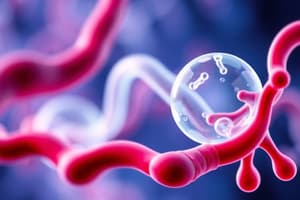Podcast
Questions and Answers
What is the primary purpose of a conceptual framework in research?
What is the primary purpose of a conceptual framework in research?
- To list all possible variables involved in the study
- To help guide the development of research questions (correct)
- To summarize the findings of past studies
- To provide a detailed methodology
Which of the following best describes a hypothesis in research?
Which of the following best describes a hypothesis in research?
- A vague assumption about the study subjects
- A summary of the research findings
- An informed prediction that can be tested (correct)
- A proven fact that needs no further exploration
What role do variables play in a research study?
What role do variables play in a research study?
- Variables are only needed in qualitative studies
- Variables eliminate the need for a hypothesis
- Variables are elements that can change and are measured (correct)
- Variables are constants that establish the study’s parameters
What is the significance of a literature review in the research process?
What is the significance of a literature review in the research process?
In quantitative research, what is typically the main focus?
In quantitative research, what is typically the main focus?
Which of the following is an example of qualitative research?
Which of the following is an example of qualitative research?
What is a key characteristic of a longitudinal study?
What is a key characteristic of a longitudinal study?
Which sampling method is considered most representative of the larger population?
Which sampling method is considered most representative of the larger population?
What is the primary focus of the content discussed?
What is the primary focus of the content discussed?
Which method is likely emphasized for understanding complex concepts?
Which method is likely emphasized for understanding complex concepts?
What type of examples would be least useful in illustrating the main ideas?
What type of examples would be least useful in illustrating the main ideas?
How should one approach learning according to the discussed content?
How should one approach learning according to the discussed content?
What aspect is crucial for applying theories effectively in practice?
What aspect is crucial for applying theories effectively in practice?
Which learning style is likely to be less effective based on the content?
Which learning style is likely to be less effective based on the content?
What role does feedback play in the described learning approach?
What role does feedback play in the described learning approach?
Which practice is least likely to foster an effective learning environment?
Which practice is least likely to foster an effective learning environment?
What is the significance of a clear and concise question stem?
What is the significance of a clear and concise question stem?
Why should distractors in multiple choice questions be homogeneous in content?
Why should distractors in multiple choice questions be homogeneous in content?
What is a recommended approach for stating the correct answer in assessment questions?
What is a recommended approach for stating the correct answer in assessment questions?
Which of the following options reflects best practices in question construction?
Which of the following options reflects best practices in question construction?
What should be avoided while reflecting common student misconceptions in distractors?
What should be avoided while reflecting common student misconceptions in distractors?
Why is it important to avoid using phrases like 'none of the above' in options?
Why is it important to avoid using phrases like 'none of the above' in options?
In the context of multiple choice questions, what is a primary goal of providing plausible distractors?
In the context of multiple choice questions, what is a primary goal of providing plausible distractors?
What is the disadvantage of negatively stated questions?
What is the disadvantage of negatively stated questions?
Which component is primarily responsible for transporting oxygen in the blood?
Which component is primarily responsible for transporting oxygen in the blood?
What is the main function of the kidneys in the human body?
What is the main function of the kidneys in the human body?
What role do enzymes play in biochemical reactions?
What role do enzymes play in biochemical reactions?
Which part of the neuron is primarily responsible for receiving signals?
Which part of the neuron is primarily responsible for receiving signals?
What is the primary purpose of the cell membrane?
What is the primary purpose of the cell membrane?
How do vaccines provide immunity?
How do vaccines provide immunity?
Which element is most abundant in the human body?
Which element is most abundant in the human body?
Which type of muscle tissue is under involuntary control?
Which type of muscle tissue is under involuntary control?
What is the primary function of glycolysis?
What is the primary function of glycolysis?
During glycolysis, how many ATP molecules are consumed in the energy investment phase?
During glycolysis, how many ATP molecules are consumed in the energy investment phase?
What is produced as a result of the oxidation of glyceraldehyde 3-phosphate in glycolysis?
What is produced as a result of the oxidation of glyceraldehyde 3-phosphate in glycolysis?
How many total ATP molecules are produced from one molecule of glucose during glycolysis?
How many total ATP molecules are produced from one molecule of glucose during glycolysis?
Which of the following is the end product of glycolysis?
Which of the following is the end product of glycolysis?
Which coenzyme is reduced during glycolysis?
Which coenzyme is reduced during glycolysis?
What type of reaction is the conversion of phosphoenolpyruvate to pyruvate?
What type of reaction is the conversion of phosphoenolpyruvate to pyruvate?
Which phase of glycolysis generates ATP?
Which phase of glycolysis generates ATP?
Flashcards are hidden until you start studying
Study Notes
Glycolysis Overview
- Glycolysis is the metabolic pathway that converts glucose into pyruvate, producing ATP and NADH.
- Occurs in the cytoplasm of cells and is an anaerobic process (does not require oxygen).
- Consists of 10 enzyme-catalyzed reactions divided into two phases: energy investment and energy payoff.
Key Steps
- Energy Investment Phase:
- First half of glycolysis where ATP is consumed.
- Converts glucose to fructose-1,6-bisphosphate using 2 ATP.
- Energy Payoff Phase:
- Second half of glycolysis where ATP (4 total) and NADH are produced.
- Ends with the production of 2 pyruvate molecules.
Important Enzymes
- Hexokinase: Converts glucose to glucose-6-phosphate, regulating glucose entry into the pathway.
- Phosphofructokinase (PFK): Key regulatory step in glycolysis; converts fructose-6-phosphate to fructose-1,6-bisphosphate.
- Pyruvate Kinase: Generates ATP by converting phosphoenolpyruvate to pyruvate, final step of glycolysis.
Energy Yield
- Net gain of 2 ATP per glucose molecule after considering the 2 ATP used in the investment phase.
- Additionally, produces 2 NADH molecules which can be used in cellular respiration.
Regulation
- Glycolysis is tightly regulated by availability of substrates and energy levels within the cell.
- Key regulatory points include hexokinase, phosphofructokinase, and pyruvate kinase; these are influenced by concentrations of AMP, ATP, and citrate.
Clinical Relevance
- Dysregulation of glycolysis is implicated in various diseases including cancer (Warburg effect) and diabetes.
- Understanding glycolysis is crucial for metabolic pathway studies and pharmacological interventions.
Studying That Suits You
Use AI to generate personalized quizzes and flashcards to suit your learning preferences.




